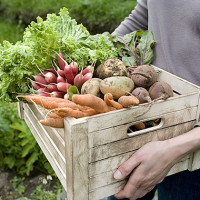An impressive roster of films, panel discussions and a special live performance is lined up for the four-day, second annual Sonoma Environmental Film Festival, which comes to town Jan. 22 through 25. The films tackle topics such as climate change, green building and sustainable cultures. Discussions following the films will provide an opportunity for audiences to interact with filmmakers and local experts.
“The purpose of the Sonoma Environmental Film Festival is to educate, inspire, and raise awareness about how to be greener, because the choices we make every day can make a huge difference,” said Justine Ashton, founder and organizer of the film festival. “It’s not easy being green, but I’ve personally found that doing so, and then taking it one step further, makes me feel a greater sense of contributing positively to the health of the planet.”
Ashton, a Glen Ellen resident, credits inspiration for the film festival to her 6-year-old granddaughter, Maya Lewis. Two years ago they were watching “An Inconvenient Truth” and Maya, who was 4 years old at the time, was appalled by the sight of smoke from a factory polluting the air. She turned to her grandmother and asked: “What are you going to do about this?” Ashton, replied: “I think I’ll start an environmental film festival.”
For last year’s festival, Ashton and her husband, Steve, saw more than 300 films before settling on a schedule. This year, they, along with an outreach team, saw some 600 films in festivals all over the world before deciding on a collection of documentaries, narrative films and animation of varying lengths and diverse subject matter. The majority of the films selected were produced in the U.S., but films from Kenya and Mongolia will also be shown.
Christopher Bedford’s “The Organic Opportunity” kicks off the festival on Thursday afternoon. The film shows how Woodbury County, Iowa adopted policies and developed programs to promote organic farming of fruits, vegetables, eggs, meat and cheese. Because of an earth-friendly shift in farming practices, the area is now enjoying a surge in economic development and is attracting farmers and businesses looking to work in an organic food economy.
“I believe that farming and our food system needs to be ecologically intelligent and sustainable in its operation; organic and permaculture farming techniques are crucial to the continued supply of healthy food to our culture,” said Bedford, who became interested in Woodbury County’s food activists when he founded Floyd Boulevard Local Food Market there. “I made ‘The Organic Opportunity’ to help communities engaged in this ‘local food revolution’ make the argument for this change.”
At the opening-night reception, ticket-buyers can sample the organic bounty featured in that evening’s film, “Hidden Bounty of Marin: Farm Families in Transition.” The film by Steve Quirt and Ellie Rilla focuses on the lives and work of nine farm families who produce meat, shellfish and row crops in Marin County and the importance to farmers of providing watershed protection and a safe habitat for the area’s wildlife.
“Rachel Carson Returns,” a performance by Lilith Lynn Rogers, delves into the life of the writer who many recognize as the founder of the modern environmental movement. Carson’s “Silent Spring” blew the whistle on the widespread use of dangerous pesticides, which eventually led to the government ban on the use of DDT and the creation of the Environmental Protection Agency. Rogers’ performance will include readings from Carson’s speeches and letters and a discussion with the audience.
“Dirt! The Movie,” a film by Bill Benenson and Gene Rosow, closes the festival on Sunday, Jan. 25. The film makes its first stop here, after its world premiere on Jan. 19 at the Sundance Film Festival. Inspired by the book, “Dirt, The Elastic Skin of the Earth,” by William Bryant Logan, the documentary offers an observation on humans’ relationship with soil.
“It is my hope that the Sonoma Environmental Film Festival, with its many thought-provoking films and discussions led by informative folks from the community, will promote positive action,” said Ashton. “For example, the food system can be changed, but it will take education and action. We want to empower audience members to do something on a daily basis to make their community, and the world, healthier.”
General admission tickets are $10 for adults and $8 for seniors (62 and older) and students. Opening night and closing night receptions and films are $10 each. Weekend passes, which includes all films and receptions, cost $85. Advance tickets and weekend passes are available by calling 707.935.3456. All films are screened at the Sonoma Valley Woman’s Club, 574 First St. E., Sonoma. For the complete film schedule, go to www.seff.us/index.asp.







